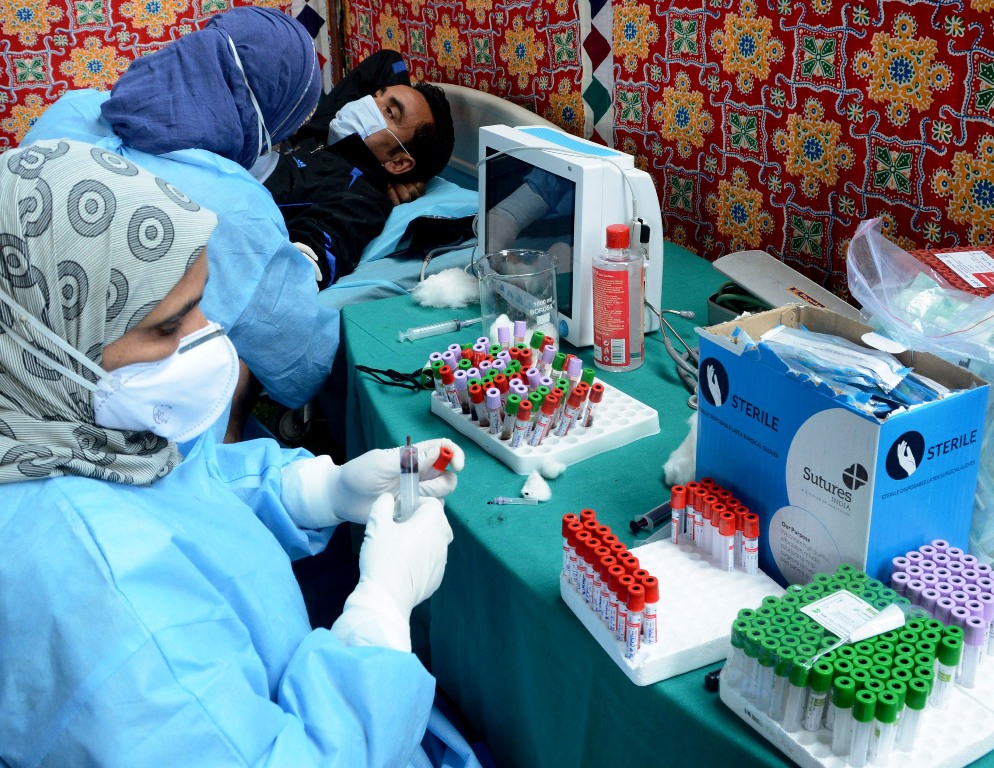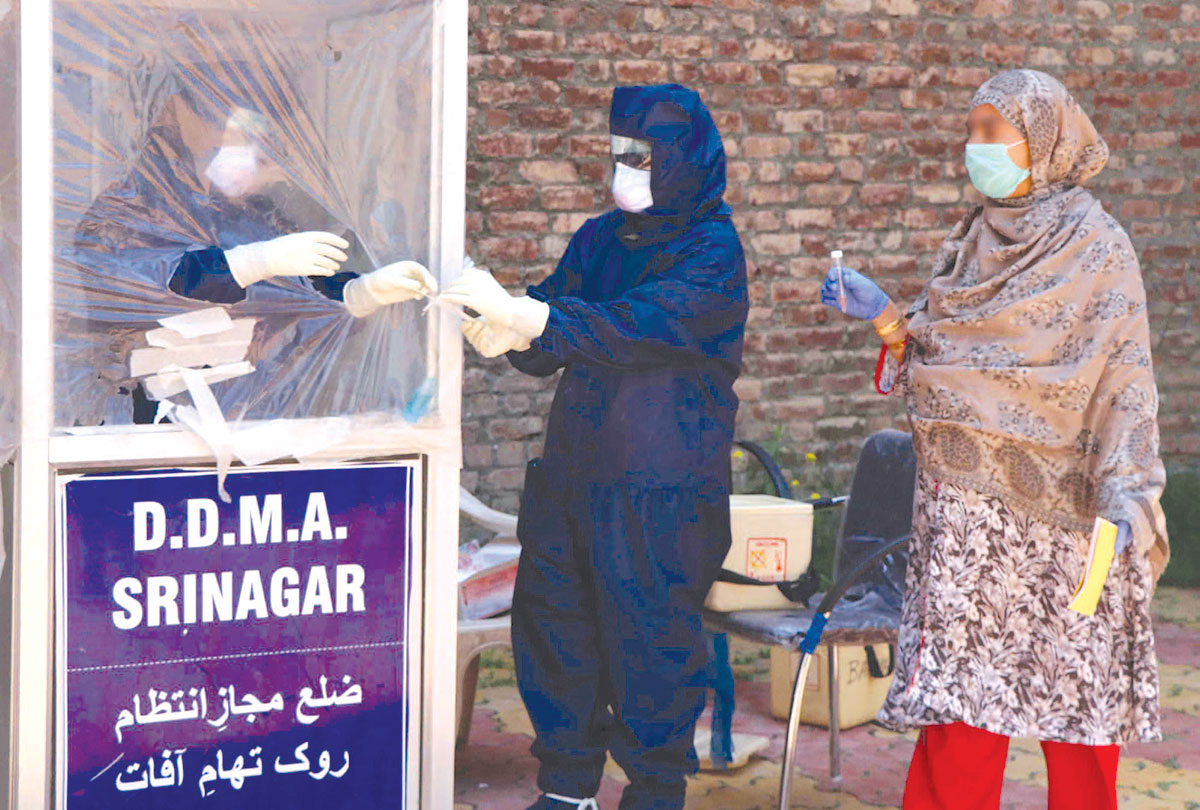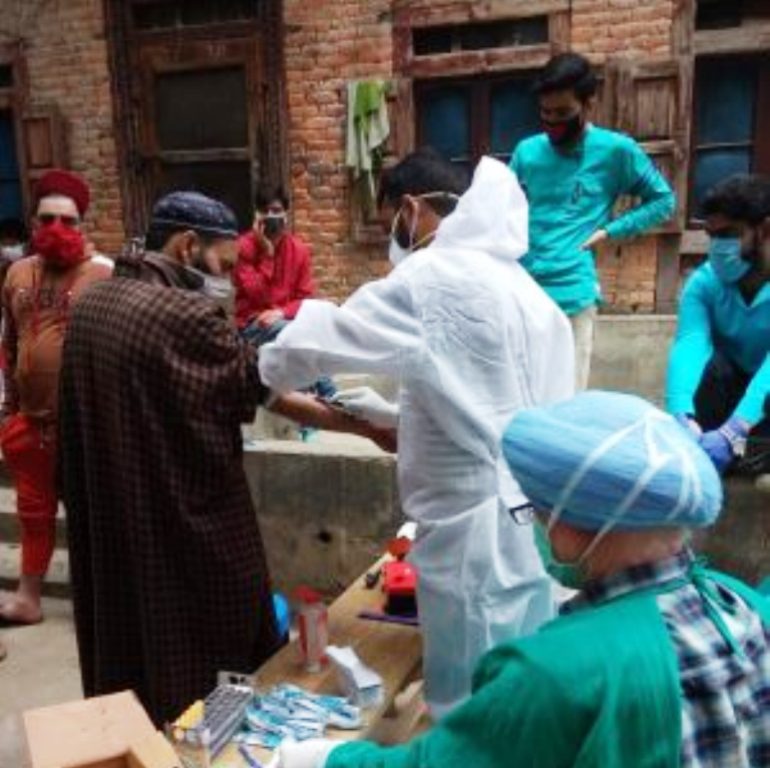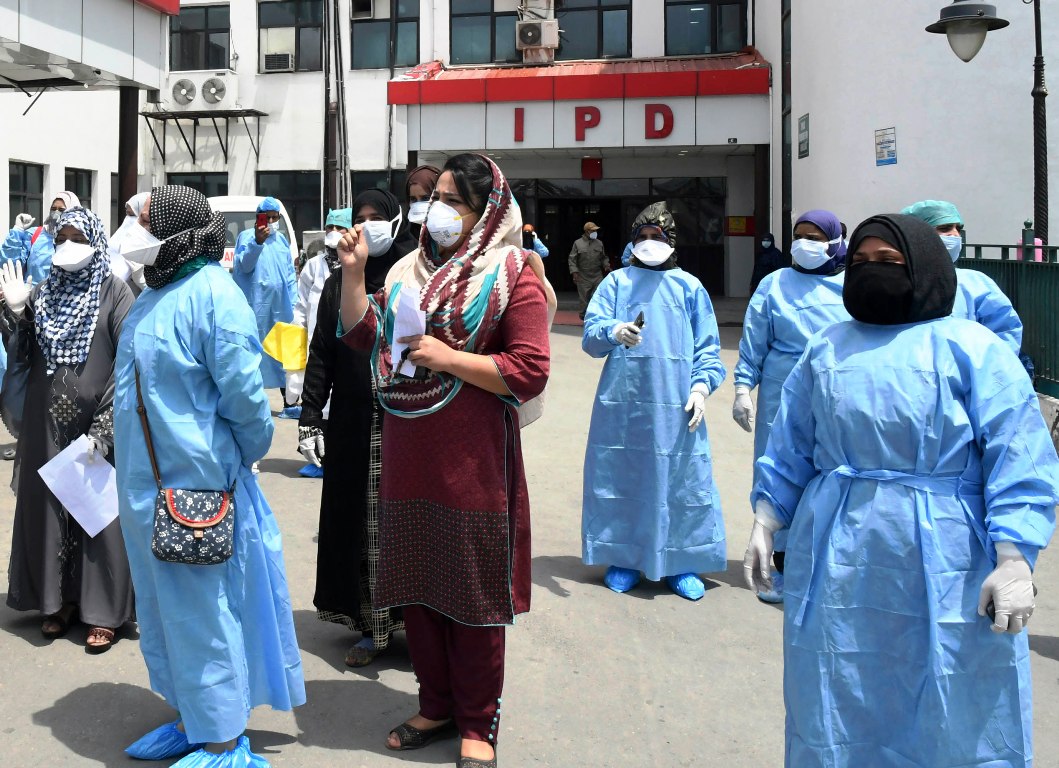In Kashmir, Covid-19 hasn’t infected and killed people alone. It has broken families or pushed them into crises that are unlikely to settle. Saima Bhat reports the emotional toll of a pandemic involving alienation of husbands from wives, in-laws from daughters-in-law and engagements that families terminated fearing the irreversible damage by the infection will mar the lives of their wards

As the spring arrived early 2019, the garden of Mirs’ at Bemina was full of different shades of daffodils. Excited to share the colours of spring foliage, the family had another reason to be happier: their only son, Aqib, had fathered his first child, a daughter. Aqib’s wife Sana’s parents at Hyderpora were also delighted at the motherhood of their only daughter.
Barring the disruptions due to Covid-19, the families had a better time together. The baby received the special treatment from the family members while Aqib and Sana enjoyed their new-found parenthood.
Abandoned Literally
However, the happiness did not last long. Around five months after her delivery, Sana returned to Bemina. A banker by profession, she resumed her duty after six months of maternity leave. Managing home, work, and newborn baby, a new routine emerged. Sana is the only member of a business family who does a day job.
With the scare of Covid around, the family wanted Sana to extend her leave by a few months more. Not able to manage, she instead assured them of taking extra precautions to ward off any eventuality. “I was not the only person going out, but yes, precautions had to be taken,” she said. But her assurance could not calm the tempers.
Struggling to deal with the hostile environment at home, she somehow made her husband understand the situation. The days passed off peacefully. But when tested, Sana along with her several colleagues was tested for Covid-19. She told the husband over the phone about the test. The next thing she did was to inform her parents. “They insisted I should take care,” she said.

Perturbed over the development, the family in Bemina got into panic mode. As Sana reached home, she was given a cold shoulder. “My in-laws revealed their true colours,” she said.
She was told to leave and stay with her parents for a while. “I thought it would be better for me as well because managing the disease and the kid would have not been smooth for me and also troublesome for my mother-in-law,” Sana said. “But I felt bad. They were almost abandoning me”.
She was in the process of shifting to Hyderpora. Sensing the care and love of her parents over the phone, she believed she had made a good decision of staying with them. Calling continuously to know her well being, as her father came to know that she is on the way, his tone changed as well. The next call was from her brother, requesting her not to come as he had two little children at home.
She went nevertheless as she had nowhere to go. She knocked on the door. However, there was no response. The next sound came from her mobile phone. It was her father, asking her to leave silently. The father requested her not to “disrupt” their home.
“He told me that if I go there, there will be discord between him and my brother’s family. My mother has passed away some five years back. Maybe if she would have been alive, I would not have been in such a situation,” Sana said.
Silent tears on her face, daughter in lap, baggage in the hand, slightly feverish and gasping for breath, Sana was shattered. The scare of the virus took the backseat, the survival emerged as a challenge. With nowhere to go, her priority was to leave the place. Back in the car, she held her daughter closely and cried bitterly. An invisible virus changed her real physical world. Out on the road, she parked the vehicle and was trying to figure out the possibilities. Since her own father and brother closed the door on her, she wasn’t sure who will open.
In between, she had suicidal thoughts but holding an infant overpowered the idea of ending life. “Everybody was behaving as if I was untouchable. At that moment I even thought of ending my life but then the six months old infant in my arms helped me dispel such thoughts,” she said. In distress, she called her maternal aunt and narrated her ordeal. Thankfully, she asked her to come home. “It was after three hours that I got an address,” she said.
As she reached, her aunt made her comfortable and suggested to stay in the outhouse because her husband is diabetic, a high-risk patient. A proposition, Sana agreed happily. “She cooked my food and then used to place it at my door.”
She had by now decided to leave her husband for not taking a stand, at least for her little daughter. “When he could not be with me during my worst time then how come he deserved to be in my life,” she said.
But the way her father treated her stopped her from taking a call. “I saw that even my father could not take a stand for me. Maybe this virus was so bad that it killed the social fabric of our lives, everybody prioritised her or his life over anybody else,” she said.
A fortnight later, Sana tested negative and joined her aunt and uncle. Living alone, as their children are settled outside, the couple had new lease of life with a mother-daughter duo. Nearly three months later, she neither went to her father’s house nor her husband’s. This scar, she said, she will “take to her grave.”
Outhouse Isolation
In a nearby locality of Hyderpora, Mehak faced a similar situation in July. As her family heard about her positive Covid-19 test results of their daughter-in-law they turned hostile as well as apprehensive. A shock to Mehak, she felt an abrupt change in behaviour. The pain was to see her mother-in-law asking her to leave the house immediately. “At that moment it was as if the ground slipped underneath my feet,” Mehak said while wiping her tears.
Explaining her position, she said the fault lied somewhere else. “After I was tested positive, I told them (in-laws) they can’t blame me because we have my husband’s aunt living in the same house. Her test was negative but she had pneumonia. I didn’t visit her but my mother-in-law used to meet and feed her.”

With every passing moment, the situation was getting worse. Arguments resulted in agitation. It was Mehak versus all and even her husband did not support it. Finally, she was asked to leave. Disheartened, she called her younger brother to take her. “I was not alone. I had my two-year-old daughter sleeping in my arms and another in my womb.”
Pregnant, while travelling with her brother around 10 pm, Mehak said she could not afford to cry to console her heart. “When we have bad times, the time doesn’t pass quickly. But that moment it felt like time was running. I was relaxed that I was going towards my parental house but the problem was my uncle and aunt, both have severe diabetes and are dependent on insulin. We live in a joint family,” she said.
As she reached, the sight gave her solace. She saw all the members waiting for her in the lawn. Understanding the severity of the situation, she decided not to enter the house but put up in one room outside. “It was a tough decision, but I did not want to hurt them,” she said.“This virus behaves abnormally. We never know who will get infected and with what viral load. So, for the safety of all they agreed. Logic had to take over emotions.”
As she retired to the bed, the attitude of her in-laws haunted her for the whole night. From the next morning, Mehak found herself in a different form of struggle. Managing a two-year-old child in a room was getting difficult for her and at the same time, the continuous phone calls from the health and district administrations were getting her anxious. As per the protocol, she was supposed to stay in a Covid-19 designated hospital even if she was asymptomatic. But witnessing the struggle of this expecting mother moved the officials and they allowed her to stay in the outhouse, with a message that if she develops a symptom, she has to inform immediately.
Managing the situation, another shock was when her daughter also tested positive. In between, her sister-in-law called and enquired about her well-being. Back at her in-law’s place, all the members had tested positive.
Realising the mistake, her husband, an assistant professor made several visits to her. But the damage, she says, was done. “The damage was already done but still I decided to be normal because I didn’t know if we could survive and how the virus was going to behave in the coming days.”
Three weeks later, Sana and the daughter tested negative. The members at her husband’s place too tested negative. The reconciliation had begun, but there was a visible crack. “My husband requested me to return home after I completed my quarantine days. It has been more than four months and we haven’t talked again about that night when all of a sudden I became homeless. That episode has bruised my soul and I don’t know how long I’ll be able to take it along.”
Accused Of Father’s Killing
For Aisha, a resident of Baghi-e-Mehtab, the story is scary. Busy in serving her aged parents-in-law, she restricted her movements and also asked her husband not to venture out unnecessarily. Confined to her home, she did not visit her parents as well.
But as the luck had it, her mother-in-law had gone to get bread from a neighbourhood baker. A day later, she complained of fever and sore throat and was immediately isolated. Later on, being tested, she was positive. But Aisha did not budge. She continued to help her and also took care of other family members.

As the required time passed, the aged woman tested negative. The family was relieved and the routine resumed, but temporarily. Having not been able to see her parents, she took her husband along and visited the couple in Barzulla. After a few hours, she left. But on the same evening, she developed symptoms. The following day she was tested and turned out to be positive. Not concerned about her health, the idea of her infection being taken to her parent’s place worried her.
Days later her fears came true. Her father tested positive and was hospitalised. With no option to leave the home, she had only a telephonic connection with the family. Isolated from the developments, she was told that the old man is doing better, but he was not. One Thursday evening, oxygen saturation failed Aisha’s father and he passed away. As the news spread, she was advised not to leave home as she too had breathing issues.
With father being home for one last time, Aisha had to see him on video. She could not visit the family. The shock remained forever. But days later as she recovered, she visited the mother. Shockingly, the family accused her of their father’s death. Abused by her siblings, she left the place.
“I was told that it was me who got the virus from my mother-in-law and infected the father,” she said adding “as if I knew I am a carrier.”
Nobody from her parent’s home visits Aisha nor does anybody talk over the phone. Living with the shock of her father’s death, the detachment from her siblings and mother has pushed her to a state of depression. “She is disturbed a lot and is currently on medication,” said Ashiq, her husband.
Left Literally
Zahida had another situation to deal with. Unlike others, she did not test positive, but the parents did.
Married for a decade, Zahida had come to her parent’s house in August as one of her cousins was getting married. The family happily participated as it was a limited gathering of close relatives only. Once done with all the functions, the virus surfaced. Zahida’s both parents tested positive. Being the only daughter, she decided to stay back and help her parents for a few days. Meanwhile, she along with her husband and three-year-old son also were tested. Fortunately, they were declared negative.
“My parents had light symptoms like fever, cold, and cough. Monitoring them was also very important. It was not possible for them to cook for themselves so I decided to stay,” said Zahida.
But when the news spread at her in-law’s place, Zahida’s mother-in-law called her. “Yes, we know you are negative but you should not come here as long as the virus goes. We never know how and when the virus will get activated,” she quoted her mother-in-law as saying. Initially, she thought her mother-in-law had a point as her daughter had just delivered a baby. But it has been more than three months now but nobody has called her from her husband’s home to return.
Zahida said her husband was supportive as he used to buy her all the groceries she needed. But he too didn’t dare to come inside the house. “He used to leave the bags at door,” she said. But now she feels a change in him too as he never asked her to return.
A Relation Ends
Salman was engaged in June this year. A small function finalized the union of distant cousins and the wedding was scheduled for next year. In the following months, the young couple talked and planned their future. But one day, a shopkeeper by profession, Salman contracted the infection.
The first to know was his fiancée. She encouraged Salman to be strong. As the days passed, he developed severe symptoms and was hospitalized. Days later, the breathing issues led to damage to his lungs. He, however, talked to his fiancée and discussed everything, and even forwarded his reports.
Once home, as Salman was in recovery mode, his fiancée sent him a message of ending the relationship. “It is not my decision alone, but my family as well. As you have complications, I don’t want to have trouble in my life,” she texted.
Dejected, he tried to call, but nobody answered. Nor his texts were responded to. A few days later, a relative who had acted as middleman came with the gold and informed the family formally.
“The father of the girl is not happy because Salman had developed complications and he believes these are irreversible, so they have decided not to move forward,” the middleman told the family and left.
Battling Taboo
Similar to the situation of Salman, Anisa too is battling the taboo. A prospective bride, the day she turned positive, no middleman has entered their home in the old city of Srinagar. In her early thirties, she said the known middleman who used to come and conveyed to the family over the phone that “for the time being, they cannot come and nobody is willing to tie the knot with patients of the virus.”
Her father, an employee, revealed that the new prerequisite besides caste, colour, creed, and status for marriage in Kashmir now is the Covid. The famous tagline of the middleman, he said is “Aeti mahaez oas Covid (Was Covid at your place).”















